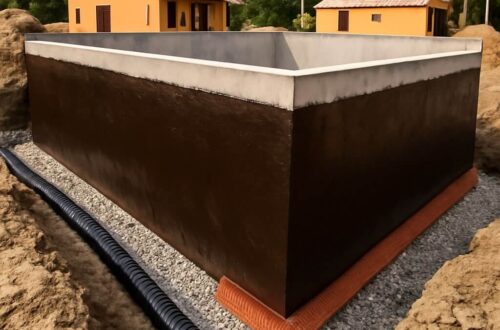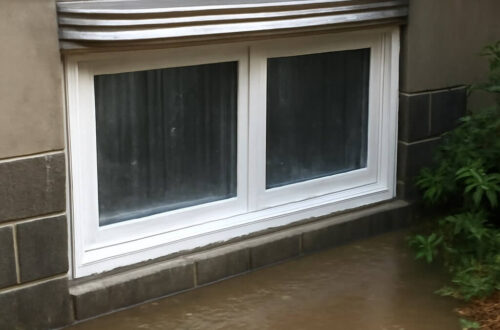If you own a home in Valley City, ND, understanding basement waterproofing is vital. Water damage can compromise your property’s integrity and value, so knowing the common causes and warning signs is essential. Various methods exist, but not all are created equal. You might wonder which solution suits your needs best. Let’s explore key facts that can help you make informed decisions about protecting your basement from moisture.
Key Takeaways
- Proper drainage systems are crucial in Valley City to prevent rainwater pooling and basement flooding.
- Signs like water stains and musty odors indicate the need for immediate waterproofing action.
- Various methods, including sump pumps and waterproof coatings, effectively protect basements from moisture intrusion.
- Regular maintenance, like inspecting gutters and sealing foundation cracks, helps maintain a dry basement.
- Compliance with local building codes and obtaining necessary permits is essential for successful waterproofing projects in Valley City.
Understanding the Importance of Basement Waterproofing
Understanding the importance of basement waterproofing is essential, especially if you want to protect your home from water damage.
Effective moisture management prevents water from entering your basement, safeguarding your belongings and maintaining a healthy living environment. When you prioritize waterproofing, you also guarantee your home’s structural integrity.
Excess moisture can weaken foundations, leading to costly repairs. By investing in proper waterproofing solutions, you enhance your home’s longevity and value.
Don’t overlook this critical aspect of home maintenance; taking action now can save you headaches and expenses down the line. Protect your space and enjoy peace of mind with a dry basement.
Common Causes of Basement Water Issues
When it comes to basement water issues, several common causes can lead to significant problems if left unaddressed.
Poor drainage systems can allow rainwater to pool around your foundation, increasing the risk of water damage. Cracks in walls or floors can also create entry points for moisture.
High humidity levels can lead to condensation, making moisture control vital. Additionally, overflowing gutters can direct water toward your basement, exacerbating the problem.
If you notice any of these issues, it’s important to take action quickly to prevent further damage and guarantee a dry, healthy basement environment.
Signs Your Basement Needs Waterproofing
Ignoring the signs of water issues in your basement can lead to costly repairs down the line. Keep an eye out for these indicators that your basement needs waterproofing:
| Signs of Water Issues | Waterproofing Benefits |
|---|---|
| Increased basement humidity | Prevents mold growth |
| Water stains on walls | Protects structural integrity |
| Musty odors | Improves air quality |
Addressing these signs early can save you money and headaches. By investing in waterproofing, you’ll enjoy a safer, healthier living space while reaping the long-term benefits of a dry basement.
Different Waterproofing Methods Explained
If you’re facing water issues in your basement, knowing the various waterproofing methods can make a significant difference in protecting your home.
Here are some common methods to take into account:
- Sump Pumps: These devices help remove excess water, preventing flooding.
- Waterproof Coatings: Applied to walls and floors, they create a barrier against moisture.
- Interior Drainage Systems: These redirect water away from the basement.
- Exterior Grading: This involves landscaping techniques to guarantee proper drainage away from your foundation.
The Role of Drainage Systems in Waterproofing
While many homeowners focus on sealing walls and floors, the effectiveness of drainage systems in waterproofing can’t be overlooked. A well-planned drainage design prevents water accumulation, protecting your basement from leaks and dampness. Regular drainage maintenance guarantees that your system functions at its best, mitigating potential water damage.
| Component | Purpose | Maintenance Tips |
|---|---|---|
| French Drains | Redirect water away | Clear debris regularly |
| Sump Pumps | Remove excess water | Test monthly, clean pump |
| Gutters | Channel roof water | Clean twice a year |
| Downspouts | Direct flow from gutters | Confirm proper extension |
Cost Factors for Basement Waterproofing
When considering basement waterproofing, you need to factor in both material quality and labor expenses.
Higher-quality materials can greatly enhance durability but often come with a higher price tag.
Additionally, skilled labor may cost more upfront, but it can save you money in the long run by preventing future issues.
Material Quality Impact
The quality of materials you choose for basement waterproofing directly affects both the effectiveness of the system and your overall costs.
Investing in high-quality waterproofing materials guarantees greater material durability, reducing the need for future repairs and maintenance.
- Long-lasting membranes prevent moisture intrusion
- High-grade sealants enhance protection against leaks
- Durable drainage systems efficiently redirect water
- Quality insulation minimizes temperature fluctuations
Labor Expenses Consideration
Choosing high-quality materials is just one piece of the puzzle; labor expenses can greatly influence your overall basement waterproofing costs.
When you’re project budgeting, consider the current labor market. Skilled labor may demand higher wages, but their expertise can prevent future issues that might cost more down the line.
Additionally, the complexity of your project can affect labor rates. If your home requires special considerations, expect to pay more for experienced contractors.
Always get multiple quotes to guarantee you’re making an informed decision. Balancing material and labor costs is essential for a successful waterproofing project.
DIY vs. Professional Waterproofing Solutions
When considering basement waterproofing, you’ll need to weigh the costs of DIY solutions against hiring professionals.
Think about your skill level and whether you can effectively tackle the job yourself, as this can impact long-term effectiveness.
Making the right choice now can save you money and headaches down the line.
Cost Considerations
Deciding whether to tackle basement waterproofing yourself or hire a professional can greatly impact your budget.
When considering your options, keep these cost factors in mind for effective budget planning:
- DIY materials: Often less expensive, but may require multiple trips to the store.
- Professional fees: Higher upfront costs, but usually guarantee a long-lasting solution.
- Time investment: DIY can take longer, affecting other projects or family time.
- Financing options: Professionals may offer payment plans, easing immediate financial pressure.
Weighing these factors will help you make an informed choice that aligns with your financial situation.
Skill Level Requirements
While many homeowners consider tackling basement waterproofing themselves, the skill level required can vary considerably based on the complexity of the problem.
If you have basic basement skills and familiarity with waterproofing techniques, minor issues like applying sealants may be manageable.
However, significant water intrusion or structural concerns often necessitate professional intervention. Professionals bring specialized knowledge and tools that guarantee effective, long-lasting solutions.
Consider your comfort level and the specific challenges your basement presents before deciding.
Long-term Effectiveness
Although you might feel confident in your DIY skills, the long-term effectiveness of waterproofing solutions often hinges on the complexity of the issue at hand.
While DIY methods can provide temporary relief, they may not guarantee lasting moisture control or protect your home’s structural integrity.
Professional solutions often offer more detailed assessments and enduring results.
- Thorough evaluation of existing damage
- High-quality materials designed for longevity
- Expert knowledge in complex moisture issues
- Warranty protection for peace of mind
Ultimately, investing in professional waterproofing can save you time, money, and stress down the road.
The Long-Term Benefits of Waterproofing
Investing in basement waterproofing not only protects your home from water damage but also offers significant long-term benefits that can enhance your property’s value and livability.
By implementing these preventative measures, you’re safeguarding against costly repairs down the line. A dry basement reduces the risk of mold and mildew, promoting a healthier living environment.
Safeguard your home with preventative measures to avoid costly repairs and create a healthier living environment.
Furthermore, waterproofing can improve your home’s energy efficiency, leading to lower utility bills.
Ultimately, you’ll see impressive investment returns when it’s time to sell, as potential buyers appreciate a well-maintained, dry basement.
Make the smart choice today for a more secure tomorrow.
Seasonal Maintenance Tips for a Dry Basement
To keep your basement dry, it’s crucial to perform seasonal maintenance.
Start by inspecting your gutters regularly to confirm they’re clear and directing water away from your foundation.
Also, check for any foundation cracks, as even small gaps can lead to significant water issues.
Inspect Gutters Regularly
When it comes to maintaining a dry basement, regularly inspecting your gutters is essential. Proper gutter maintenance helps direct water away from your foundation, preventing moisture issues.
Make seasonal inspections a priority to catch any problems early. Here are key aspects to focus on:
- Check for clogs: Remove leaves and debris that can block water flow.
- Inspect for damage: Look for cracks or rust that may need repairs.
- Verify proper slope: Make sure gutters pitch toward downspouts for efficient drainage.
- Clean downspouts: Ensure they’re clear and extend away from your home’s foundation.
Taking these steps can save you from costly basement repairs.
Check Foundation Cracks
While checking your gutters is essential, keeping an eye on foundation cracks is equally important for maintaining a dry basement.
Regular foundation inspections help you spot any cracks early, preventing water intrusion and costly damage. Look for cracks of any size, as even small ones can lead to bigger problems over time.
If you find cracks, consider crack sealing to protect your foundation from moisture. Use a high-quality sealant to guarantee a tight barrier against water.
Local Regulations and Permits for Waterproofing in Valley City
Have you checked the local regulations and permits for basement waterproofing in Valley City?
It’s vital to comply with local building codes to guarantee your project meets safety standards. Before starting, make certain you obtain the necessary permits.
Complying with local building codes and obtaining necessary permits is essential for a safe and successful waterproofing project.
Here are some key points to take into account:
- Review Valley City’s specific waterproofing guidelines
- Confirm permit requirements for your project
- Consult with local authorities for compliance
- Keep documentation organized for inspections
Following these steps not only protects your investment but also guarantees your basement remains safe and dry.
Don’t skip these important regulations; they’re fundamental for a successful waterproofing project.
Conclusion
In Valley City, ND, basement waterproofing isn’t just an option; it’s a necessity for protecting your home. By understanding the causes of water issues and recognizing the signs, you can take proactive steps to safeguard your property. Whether you choose DIY methods or hire professionals, investing in waterproofing pays off in the long run. Don’t forget to keep up with seasonal maintenance and local regulations to guarantee your basement stays dry and your home remains structurally sound.






